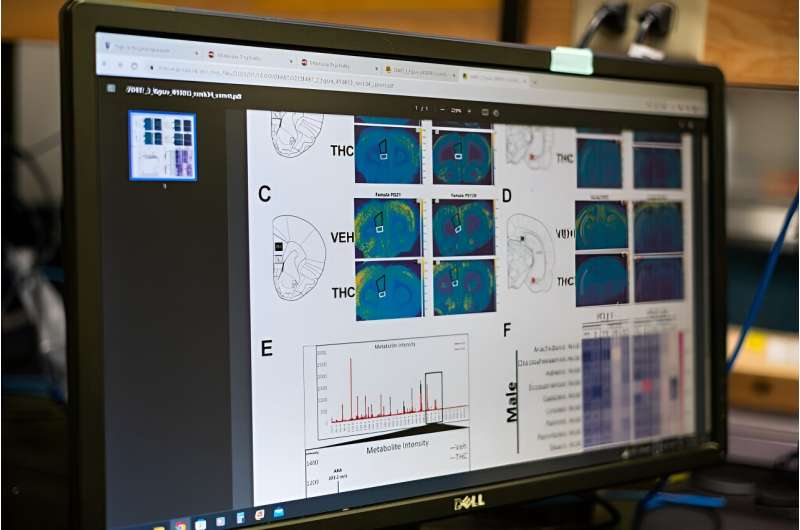This article has been reviewed according to Science X's editorial process and policies. Editors have highlighted the following attributes while ensuring the content's credibility:
fact-checked
peer-reviewed publication
trusted source
proofread
Study suggests cannabis use during pregnancy could cause lifelong cognitive deficits for offspring

While previous research has shown that prenatal cannabis exposure can obstruct the normal growth of a fetus, the long-term impacts on brain development are still unknown. Western researchers are now providing fresh insight into this area, while also identifying a possible direction to treat the adverse effects.
Led by Addictions Research Group member Mohammed H. Sarikahya and Schulich Medicine & Dentistry professor Steven Laviolette, a new study, published in the journal Molecular Psychiatry has shown that prenatal exposure to cannabis in rodents led to lasting, substantial effects on cognitive and memory functions.
Interestingly, these effects are sex-specific, suggesting males and females may be affected differently by cannabis exposure in the womb.
According to the Canadian Center on Substance Use and Addiction, cannabis usage is reported among up to 22% of Canadian pregnant women aged 18–24, underlining the critical significance of the study's findings.
"Over the past two decades, concentrations of THC—the primary psychoactive component in cannabis—have risen from 3% to 22%. THC can pass through the placenta and impact the developing fetal brain," said Sarikahya.
"Our research shows that prenatal THC exposure can lead to serious cognitive and memory deficits that are sex-dependent, enduring and potentially lifelong," said Sarikahya.
The team of researchers used a variety of tests to measure the effects of prenatal THC exposure on animal models, including social interaction, spontaneous alternation and object recognition tests. These assessments showed that prenatal exposure to THC significantly impacted the offspring's desire to socialize, memory of previous social encounters and learning capabilities in both males and females.
Most importantly, the study also suggests a potential solution to these effects. By targeting irregularities in brain fatty acids it might be possible to reduce the adverse impacts of prenatal cannabis exposure.
The researchers found that THC disrupts the fetal endocannabinoid system (ECS), a key player in fetal and adolescent neurodevelopment, as well as cognitive and emotional processing.
"This disruption leads to deficiencies in vital fatty acids like DHA and ARA, potentially causing lifelong health disturbances," said Laviolette, professor in the department of anatomy and cell biology at Schulich Medicine & Dentistry.
Delving into the molecular impacts, the researchers found changes in levels of important fatty acids in the brain and variations in certain protein levels, both critical for normal brain function. These alterations were more pronounced in adult males and differed depending on the specific region of the brain.
The study also underscores the distinct impacts of prenatal cannabis exposure between males and females. Both male and female offspring showed cognitive deficits, but the mechanisms differed significantly between the sexes.
The study found that females showed very active brain activity in a part of the brain called the ventral hippocampus. The ventral hippocampus is a part of the brain involved in things like emotion and memory. On the other hand, males showed less active brain activity in this same area.
"This suggests prenatal cannabis exposure can have sex-specific effects on the developing brain, leading to different patterns of cognitive and behavioral disturbances in males and females," said Laviolette.
More information: Mohammed H. Sarikahya et al, Prenatal THC exposure induces long-term, sex-dependent cognitive dysfunction associated with lipidomic and neuronal pathology in the prefrontal cortex-hippocampal network, Molecular Psychiatry (2023). DOI: 10.1038/s41380-023-02190-0


















